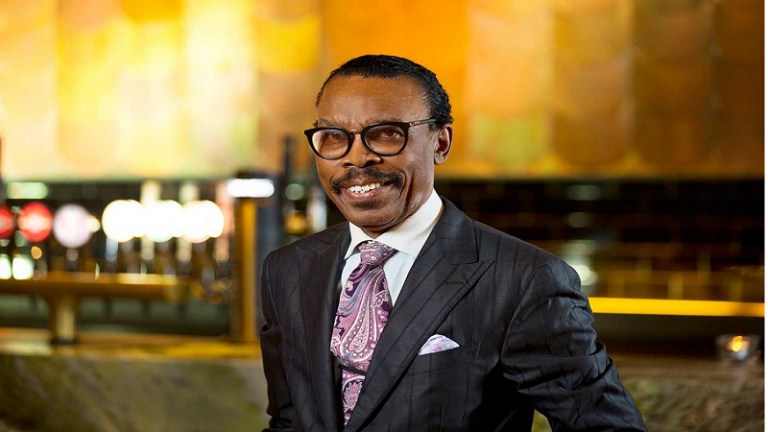
Renowned economist and CEO of Financial Derivatives Company, Bismarck Rewane, has defended the Central Bank of Nigeria’s (CBN) decision to deploy $8 billion in stabilizing the naira, dismissing concerns that the move contradicts Nigeria’s supposedly floating exchange rate.
Speaking on Arise TV’s Global Business Report on Monday, Rewane analyzed the economic rationale behind the CBN’s actions, likening it to similar currency defense mechanisms implemented by other global economies to correct exchange rate distortions.
Rewane’s comments come amid widespread backlash, with critics arguing that Nigeria’s forex market is meant to operate freely, following President Bola Tinubu’s commitment to implementing a market-driven exchange rate system as part of his economic reforms. However, the CBN’s direct intervention in the foreign exchange market has raised questions about whether the government is truly allowing the naira to float or defending it under the guise of stabilization.
Register for Tekedia Mini-MBA edition 19 (Feb 9 – May 2, 2026).
Register for Tekedia AI in Business Masterclass.
Join Tekedia Capital Syndicate and co-invest in great global startups.
Register for Tekedia AI Lab.
Many have drawn parallels between the CBN’s FX intervention and the federal government’s controversial continued payment of fuel subsidies, despite an earlier declaration that subsidies had been removed.
Rewane’s assertion that the CBN has spent $8 billion to defend the naira stirred controversy, particularly because Tinubu’s government had previously announced a commitment to floating the currency. Following its floatation, the naira’s value was expected to be determined by the forces of demand and supply, with minimal government interference.
However, the latest intervention has drawn accusations of policy inconsistency, as critics argue that Nigeria is effectively propping up the naira artificially rather than allowing it to find its true value through market forces.
Rewane’s Defense: Why the CBN’s Actions Are Justified
Rewane dismissed concerns about the CBN’s decision, citing historical examples of countries that have spent far greater sums defending their currencies. He referenced the United Kingdom’s decision to spend $27 billion to defend the British pound under Margaret Thatcher in the 1990s, China’s massive $1.2 trillion intervention between 2015 and 2016, Russia’s $80.5 billion deployment between 2014 and 2015, and Switzerland’s $480 billion intervention in its currency market.
The economist argued that compared to these figures, Nigeria’s $8 billion is relatively small and should not be considered excessive. He further emphasized that the naira is currently undervalued, and correcting its misalignment is necessary for economic stability.
“So, if I say that the Nigerian government is using $8 billion – which is peanut – to support its currency, an undervalued currency, not an overvalued currency, quite frankly, that’s a good thing. So, we need to support that kind of initiative. If they were supporting an overvalued currency, then of course not,” he said.
Rewane justified the CBN’s intervention using a Purchasing Power Parity (PPP) analysis, which shows that the fair value of the naira stands at N1,102.15 per dollar. This suggests that the currency is undervalued by 26.35%, reinforcing the need for stabilization measures.
He argued that when a central bank intervenes to protect an overvalued currency, it creates artificial demand, leading to distortions and potential market inefficiencies. However, in the case of an undervalued currency, intervention is a positive measure because it corrects misalignment and restores market stability.
“If you intervene to protect an overvalued currency, that’s bad. That’s negative. But if you intervene to support an undervalued currency, you’re actually bringing the currency back from its misalignment to its alignment. So, that’s what the Central Bank of Nigeria (CBN) is doing. And we applaud them for doing that,” he said.
He also pointed out that the gap between the parallel and official exchange rates has significantly narrowed to less than 1%, compared to previous discrepancies of 10–20%. Additionally, Nigeria’s balance of trade now stands at $18.6 billion, its highest in a long time, indicating that CBN’s policies are yielding results.
Market Stability vs. Policy Contradictions
While critics argue that CBN’s intervention contradicts Nigeria’s commitment to a floating exchange rate, Rewane insists that the central bank’s role is to ensure stability, not to allow uncontrolled fluctuations.
“What is important to investors is not the value of the currency but the stability of the currency. When you intervene to create stability, that is exactly the role of the Central Bank, and the markets are responding positively,” he said.
However, many financial experts believe that this approach signals a policy inconsistency, where the government declares market-driven policies publicly but intervenes behind the scenes. This has led to growing skepticism over whether Nigeria’s forex market is truly liberalized or merely managed under a different label.
Addressing public skepticism, Rewane criticized the spread of misinformation about the CBN’s forex interventions, urging Nigerians to focus on results rather than speculation.
“There are mercenaries on the internet who are saying things they don’t understand. The big picture is: Are these policies working? Are they for the good of the country? My humble opinion is that the policies are working,” he said.



